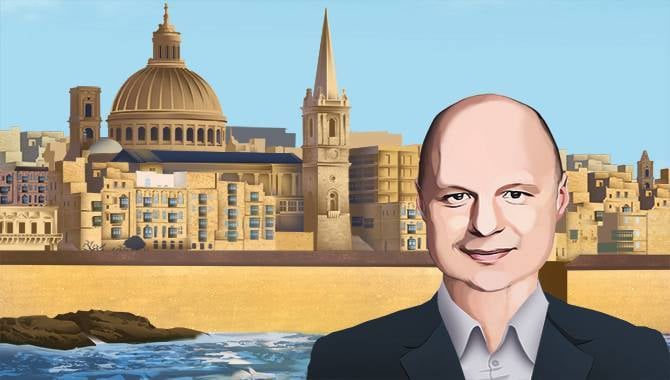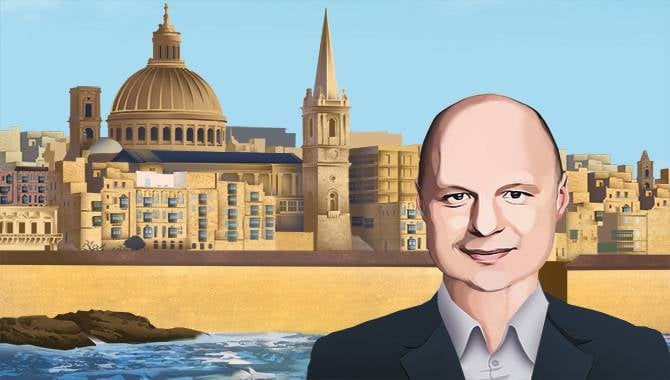
If anyone is having second thoughts about working in gaming, they should have a chat with Jesper Svensson. Amid the sea of doom and gloom pervading the sector’s current perception, the Betsson Group CEO is a bastion of positivity.
As he talks through the challenges operators like Betsson face in modern markets with Gambling Insider, the Swede has more than a hint of pragmatism about him. But that pragmatism also reminds Svensson never to forget the benefits of occupying a role he is “very privileged” to hold.
“We have to remember this is a very good industry to be in,” he says. “There is structural growth and there will be structural growth for many years to come. Gaming is growing both online and offline; online is growing faster, so online gaming is a very good space to be in. There has been a good level of growth for many years. Sometimes, it slows a little and the industry needs to reshape itself. It’s important to keep in mind, among all the changes, gaming is a strong, growing industry.”
Svensson speaks from experience, of course, as it’s a space he’s been a part of since 2006. The exec’s stay with Betsson has lasted six years so far, following roles at Ladbrokes, InterCasino and Bodog. Based in Malta, Svensson has overseen “a lot” of change both at the company and within the industry during that time. A case in point came during his two years to date as CEO, as Betsson addressed a number of internal challenges with a significant restructuring. They resulted in the organisation finishing 2018 in a “very, very positive way,” rebounding from a turbulent 2017 through a 15% increase in full-year revenue to SEK 5.41bn ($580m). EBIT grew 35% to SEK 1.19bn and net income rose 37% to SEK 1.07bn.
In 2019 however, Betsson wasn’t alone in experiencing a far tougher climate. Svensson explains: “This year has not come without its challenges. This time, they’re more on the external side, in terms of regulatory changes. They have not only hit us but, of course, many companies within the industry. Both Sweden and the Netherlands have been a challenge for us. All in all, those factors have had an impact for us this year. I would say one of the larger challenges is if you go back six years, the regulatory impact was not as high.”
In the face of these difficulties though, Svensson’s determination to focus on the upside has its benefits – starting with the very place he lives. Malta, such a devoted gaming hub Gambling Insider dedicates this annual publication to it, is awash with operators and suppliers. Often, gaming offices are clumped together, with any group walking down an adjacent street guaranteed to contain at least one gaming firm employee. For some, this leads to an almost claustrophobic sense of overcrowding. For others, it creates an unwelcoming lack of variety. This is not the case for Svensson.
“I really enjoy my time here on the island,” he says. “I would say it’s a good lifestyle here, with the Mediterranean and, of course, the sun is something that is very positive, especially if you are from Sweden originally. I also think Malta is a very gaming-friendly place to be. Gaming is important for Malta; it’s on the agenda for the country.
“That in itself has created a good environment. This is one of the strongest industries in the country.” If there is ever a problem meanwhile, Svensson adds: “It’s a small country but it’s very easy to travel elsewhere so you can get away for weekends. I quite frequently visit our offices in other places in the world, as well.”
Svensson’s day-to-day focus in Malta is the operational side of Betsson’s business. This is a point some readers may be seeking clarification on: if you are one of them, you’d be forgiven for thinking Pontus Lindwall is Betsson Group CEO. Svensson confirms Lindwall too is a CEO at Betsson. But the exec is more than happy to provide further detail, admitting Gambling Insider is not the first to ask how Svensson’s role functions alongside Lindwall’s.
“It’s a well-defined structure in that Pontus is the CEO of Betsson AB, the entity on the Nasdaq in Stockholm,” the Swede says. “Betsson AB is the holding company, or mother company if you like, which invests in gaming companies. I’m the CEO of Operations, so I run all the subsidiaries which are owned by Betsson AB. You can say one role is focused much more towards the financial markets and my role is then more focused on the operational side, running the day-to-day business, marketing and technology.”
A constant dialogue exists for Svensson and Lindwall and there is a “clear distinction” between the two roles; any fans of the US Office can rest assured this isn’t the same as when Michael Scott and Jim Halpert keep crossing wires as co-managers. Away from this dynamic, Svensson naturally faces general day-to-day issues, insisting “every day has its own challenges.” The “geographical spread” of Betsson’s 12 different licenses is one he singles out, as it “means there’s always some kind of challenge going on in different markets.”
That brings us back to the main difficulty Svensson is quick to highlight – and one he is not alone in deliberating over. Growing regulation is, of course, the topic he speaks of and perhaps the biggest example from the past year can be found in the Swedish market. On 1 January 2019, Sweden re-regulated its gaming space to welcome private businesses. At the time, Lindwall told Gambling Insider Betsson “should be one of the cornerstones of the Swedish gaming market.”
What has followed can neither be deemed a resounding success nor an abject failure. It has been a mixed bag for Sweden, equally sweet and sour, as Betsson’s difficulties in the Nordic markets demonstrate. In its H1 report, Betsson announced revenue growth of just 2% year-on-year to SEK 2.6bn ($280m), while Q2 revenue fell 5% to SEK 1.27bn. Operating income was down 12% to SEK 452.1m for H1 and fell from SEK 300.7m to SEK 196.9m year-on-year for Q2; casino was a vertical which felt the pinch in particular, dropping 10% for Q2.
Things did not stop there in Sweden, as a number of firms were handed fines for falling foul of the new regulatory framework throughout the course of 2019 – including a Betsson subsidiary. Commentators expect the relationship between regulator and operators to improve with time and so does Svensson. But he admits life in the re-regulated market has certainly come with its teething problems: “It has had an impact on our business in the short term. We should not forget we very much welcomed this regulation, which was looked forward to for a long period of time. Over time, we also believe it will be a very good market for us. So it is about adapting to the new circumstances.
“I think, for any regulator, they have to find a good balance between being business-friendly and supporting the companies that have a license; if a lot of players fall outside the framework, the framework has not been successful. That balance is not fully there in all jurisdictions today, because I think it is important from the regulatory point of view the regulator takes care of and supports companies within the framework, not opening up for opportunities outside those frameworks.”
One regulator the Betsson Group CEO is full of praise for though, is the Malta Gaming Authority. “I would say the Maltese regulator is one of the most competent, if not actually the most competent, regulator out there given the history and experience they have,” he explains. “They can contribute a lot to other regulators. They’re a tough regulator, of course; that has become more visible and they have taken strong measures over the years.”
When Gambling Insider poses the question of how the Maltese regulator might have approached similar re-regulation, Svensson points out we are only “at an early stage” in Sweden. “The dialogue between operators and the regulator is not as developed as it is in other jurisdictions, so I think that will improve going forward,” he says.
“It also comes down to getting the right guidance. If there is something you need guidance on in the new regulation, it’s important the regulator gives the operator that information and doesn’t just refer them to a legal paragraph. Here, I think the Swedish regulator has some work to do.”
Another CEO who would certainly agree with Svensson here is Global Gaming’s Tobias Fagerlund. In June, SafeEnt, a subsidiary of Global Gaming, had its Swedish license revoked by the Swedish Gambling Authority. In response, Fagerlund labelled the decision “unlawful” and insisted the regulator was mistaken to enforce a law which remains unclear. The CEO went further, telling Gambling Insider he was only notified of the outcome eight minutes before it was made public – at 8am on a Monday morning.
The Betsson Group CEO continues: “With time, these things tend to mature and become better; if you look at how many companies have been fined in Sweden this year for various reasons, I don’t think it’s because companies didn’t want to follow what they thought was the right way to do things. I think,with better guidance, we would have seen far fewer incidents.”
Another market posing regulatory hurdles for Betsson, as Svensson mentioned earlier in our interview, is the Netherlands. Dutch online gaming enjoyed a landmark year in 2019, its long-awaited Remote Gaming Bill finally receiving approval. Two-and-a-half years after it was passed in the House of Representatives, analyst Willem van Oort told Gambling Insider it was a “surreal experience” to finally see the Act written into law. In practice, this means a licensing process beginning in the middle of 2020 and a scheduled launch of 1 January 2021. This also involves a cooling off period of 24 months, when a company cannot apply for a license if it has operated in the market unlawfully within the past two years.
“We believe, eventually, we will participate in the Dutch market, which is opening up,” Svensson explains. “We had to make adaptations to this offering, to qualify for the criteria they had set out. That is something we have now done, which leaves us in a strong position when it comes to the licensing process. So we had to make those changes to be able to participate in the Dutch regulation.”
The final jurisdiction readers may be wondering about is the UK, another heavily-regulated, highly-competitive marketplace that has lost ComeOn and EveryMatrix in the last few months (see p32 for our feature on Malta-based firms leaving the UK). In December 2018, Betsson announced the closure of its office in the region and that its Netplay brands would not renew contracts with UK broadcasters. Many took this as a sign the operator was reducing its UK focus, perhaps with one eye on an outright departure. But Svensson informs Gambling Insider the organisation has not yet exited the market – and has no plans to.
“We are still in the UK market, so we haven’t left,” the Swede says. “But we have not been as active as we were a few years ago. Right now, we are working on migrating a business we bought several years ago onto our own platform – the NetPlay brands – and that will be done before this year. We still have activities in the UK, but we haven’t invested the same way we did several years ago. We believe, with those brands under the NetPlay umbrella, we needed to upgrade that product offering before investing further into it; that is what is happening right now.”
Away from existing markets, Svensson believes a range of new opportunities are opening up for the operator. He emphasises the control Betsson has over customer experience, given it develops its own sportsbook, gaming platform and payment platforms. As Betsson takes its pursuit for growth and market share into its 57th year of existence however, it is no surprise the end of our interview sees Svensson return to a topic he clearly attaches great importance to.
Reiterating his message of positivity to the rest of the gaming sector, he concludes: “As an industry, it’s important we get together more often and drive a more common agenda to affect things in a positive manner. This has not always been the industry’s strongest side. But I hope some of these changes will lead to the industry coming together to form a joint drive and agenda.
“At times, if you have read both mainstream and industry media in the last six to nine months, I think there has been a lot of focus on the negative aspects, while the industry itself is maturing and has become much stronger and more professional. There has been some very positive development as well, which I think it would be good for us to emphasise further than what we have done in the last year.”
One thing’s for sure: if the rest of the sector can mirror Svensson’s attitude, 2020 will provide a far brighter outlook for gaming. As the Betsson Group CEO warns, “every year has its own challenges and opportunities.” But, for him, gaming’s glass is never half empty, always half full.



